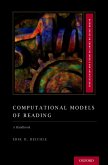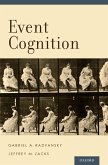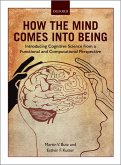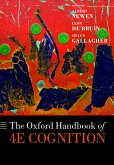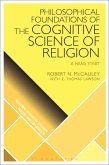Sentence First, Arguments Afterward (eBook, PDF)
Essays in Language and Learning
Redaktion: Lidz, Jeffrey


Alle Infos zum eBook verschenken

Sentence First, Arguments Afterward (eBook, PDF)
Essays in Language and Learning
Redaktion: Lidz, Jeffrey
- Format: PDF
- Merkliste
- Auf die Merkliste
- Bewerten Bewerten
- Teilen
- Produkt teilen
- Produkterinnerung
- Produkterinnerung

Hier können Sie sich einloggen

Bitte loggen Sie sich zunächst in Ihr Kundenkonto ein oder registrieren Sie sich bei bücher.de, um das eBook-Abo tolino select nutzen zu können.
Sentence First, Arguments Afterward collects the most important papers of Lila Gleitman's career, spanning over 50 years of work. These papers explore the nature of linguistic knowledge in children and adults by asking how children acquire language, how language and thought are related, the nature of concepts, and the role of syntax in shaping the direction of word learning. With an exclusive foreword by Noam Chomsky and an essay by Jeffrey Lidz contextualizing Gleitman's work in the emergence of the field of cognitive science, this book promises to be valuable both for its historical…mehr
- Geräte: PC
- mit Kopierschutz
- eBook Hilfe
- Größe: 32.15MB
![Sentence First, Arguments Afterward (eBook, ePUB) Sentence First, Arguments Afterward (eBook, ePUB)]() Lila GleitmanSentence First, Arguments Afterward (eBook, ePUB)48,95 €
Lila GleitmanSentence First, Arguments Afterward (eBook, ePUB)48,95 €![Computational Models of Reading (eBook, PDF) Computational Models of Reading (eBook, PDF)]() Erik D. ReichleComputational Models of Reading (eBook, PDF)35,95 €
Erik D. ReichleComputational Models of Reading (eBook, PDF)35,95 €![Event Cognition (eBook, PDF) Event Cognition (eBook, PDF)]() Gabriel A. RadvanskyEvent Cognition (eBook, PDF)68,95 €
Gabriel A. RadvanskyEvent Cognition (eBook, PDF)68,95 €![How the Mind Comes into Being (eBook, PDF) How the Mind Comes into Being (eBook, PDF)]() Martin V. ButzHow the Mind Comes into Being (eBook, PDF)37,95 €
Martin V. ButzHow the Mind Comes into Being (eBook, PDF)37,95 €![The Oxford Handbook of 4E Cognition (eBook, PDF) The Oxford Handbook of 4E Cognition (eBook, PDF)]() The Oxford Handbook of 4E Cognition (eBook, PDF)44,95 €
The Oxford Handbook of 4E Cognition (eBook, PDF)44,95 €![Chaos and Nonlinear Psychology (eBook, PDF) Chaos and Nonlinear Psychology (eBook, PDF)]() Chaos and Nonlinear Psychology (eBook, PDF)44,95 €
Chaos and Nonlinear Psychology (eBook, PDF)44,95 €![Philosophical Foundations of the Cognitive Science of Religion (eBook, PDF) Philosophical Foundations of the Cognitive Science of Religion (eBook, PDF)]() Robert N. MccauleyPhilosophical Foundations of the Cognitive Science of Religion (eBook, PDF)29,95 €
Robert N. MccauleyPhilosophical Foundations of the Cognitive Science of Religion (eBook, PDF)29,95 €-
-
-
Dieser Download kann aus rechtlichen Gründen nur mit Rechnungsadresse in A, B, BG, CY, CZ, D, DK, EW, E, FIN, F, GR, HR, H, IRL, I, LT, L, LR, M, NL, PL, P, R, S, SLO, SK ausgeliefert werden.
- Produktdetails
- Verlag: Oxford University Press
- Erscheinungstermin: 1. April 2020
- Englisch
- ISBN-13: 9780199828104
- Artikelnr.: 59784115
- Verlag: Oxford University Press
- Erscheinungstermin: 1. April 2020
- Englisch
- ISBN-13: 9780199828104
- Artikelnr.: 59784115
- Herstellerkennzeichnung Die Herstellerinformationen sind derzeit nicht verfügbar.
Jeffrey Lidz * Section II. WHAT DO THEY KNOW AND WHEN DID THEY KNOW IT? * Chapter 2. The Impossibility of Language Acquisition (And How They Do It)
Lila R. Gleitman
Mark Y. Liberman
Cynthia A. McLemore
and Barbara H. Partee * Chapter 3. A Study in the Acquisition of Language: Free Responses to Commands
Elizabeth F. Shipley
Carlota S. Smith
and Lila R. Gleitman * Chapter 4. The Emergence of the Child as Grammarian
Lila R. Gleitman
Henry Gleitman
and Elizabeth F. Shipley * Chapter 5. Language Use and Language Judgment
Henry Gleitman and Lila R. Gleitman * Section III. WHERE DOES LANGUAGE KNOWLEDGE COME FROM? INPUT AND INNATENESS * Chapter 6. Mother
I'd Rather Do It Myself: Some Effects and Non-Effects of Maternal Speech Style
Elissa L. Newport
Henry Gleitman
and Lila R. Gleitman * Chapter 7. Beyond Herodotus: The Creation of Language by Linguistically Deprived Deaf Children
Heidi Feldman
Susan Goldin-Meadow
and Lila R. Gleitman * Chapter 8. Every Child an Isolate: Nature's Experiments in Language Learning
Lila R. Gleitman and Barbara Landau * Section IV. HARD WORDS AND SYNTACTIC BOOTSTRAPPING A: ESTABLISHING PLAUSIBILITY * Chapter 9. Structural Sources of Verb Learning
Lila R. Gleitman * Chapter 10. On the Semantic Content of Subcategorization Frames
Cynthia Fisher
Lila R. Gleitman
and Henry Gleitman * Chapter 11. Human Simulations of Vocabulary Learning
Jane Gillette
Lila R. Gleitman
Henry Gleitman
and Anne Lederer * Section V. HARD WORDS AND SYNTACTIC BOOTSTRAPPING B: BUT IS IT TRUE? * Chapter 12. Understanding How Input Matters: Verb Learning and the Footprint of Universal Grammar
Jeffrey Lidz
Lila R. Gleitman
and Henry Gleitman * Chapter 13. Hard Words
Lila R. Gleitman
Kimberly Cassidy
Anna Papafragou
Rebecca Nappa
and John C. Trueswell * Chapter 14. When We Think About Thinking: The Acquisition of Belief Verbs
Anna Papafragou
Kimberly Cassidy
and Lila R. Gleitman * Section VI. EASY WORDS? NOT SO EASY * Chapter 15. How Words Are (and Are Not) Learned by Observation
Tamara N. Medina
John C. Trueswell
Jesse Snedeker
and Lila R. Gleitman * Chapter 16. Propose But Verify: Fast Mapping Meets Cross-Situational Word Learning
John C. Trueswell
Tamara N. Medina
Alon Hafri
and Lila R. Gleitman * Chapter 17. Quality of Input Predicts Child Vocabulary Three Years Later
Erica A. Cartmill
Benjamin F. Armstrong III
Lila R. Gleitman
Susan Goldin-Meadow
Tamara N. Medina
and John C. Trueswell * Chapter 18. The Easy Words: Reference Resolution in a Malevolent Referent World
Lila R. Gleitman and John C. Trueswell * Section VII. WORDS AND CONCEPTS * Chapter 19. What Some Concepts Might Not Be
Sharon Armstrong
Lila R. Gleitman
and Henry Gleitman * Chapter 20. Why Stereotypes Aren't Even Good Defaults
Andrew C. Connolly
Jerry A. Fodor
Lila R. Gleitman
and Henry Gleitman * Chapter 21. "Similar" and Similar Concepts
Lila R. Gleitman
Henry Gleitman
Carol Miller
and Ruth Ostrin * Chapter 22. The Emergence of the Formal Category "Symmetry" in a New Sign Language
Lila R. Gleitman
Ann Senghas
Molly Flaherty
Marie Coppola
and Susan Goldin-Meadow * Chapter 23. Turning the Tables: Spatial Language and Spatial Reasoning
Peggy Li and Lila R. Gleitman * Chapter 24. Relations Between Language and Thought
Lila R. Gleitman and Anna Papafragou
Jeffrey Lidz * Section II. WHAT DO THEY KNOW AND WHEN DID THEY KNOW IT? * Chapter 2. The Impossibility of Language Acquisition (And How They Do It)
Lila R. Gleitman
Mark Y. Liberman
Cynthia A. McLemore
and Barbara H. Partee * Chapter 3. A Study in the Acquisition of Language: Free Responses to Commands
Elizabeth F. Shipley
Carlota S. Smith
and Lila R. Gleitman * Chapter 4. The Emergence of the Child as Grammarian
Lila R. Gleitman
Henry Gleitman
and Elizabeth F. Shipley * Chapter 5. Language Use and Language Judgment
Henry Gleitman and Lila R. Gleitman * Section III. WHERE DOES LANGUAGE KNOWLEDGE COME FROM? INPUT AND INNATENESS * Chapter 6. Mother
I'd Rather Do It Myself: Some Effects and Non-Effects of Maternal Speech Style
Elissa L. Newport
Henry Gleitman
and Lila R. Gleitman * Chapter 7. Beyond Herodotus: The Creation of Language by Linguistically Deprived Deaf Children
Heidi Feldman
Susan Goldin-Meadow
and Lila R. Gleitman * Chapter 8. Every Child an Isolate: Nature's Experiments in Language Learning
Lila R. Gleitman and Barbara Landau * Section IV. HARD WORDS AND SYNTACTIC BOOTSTRAPPING A: ESTABLISHING PLAUSIBILITY * Chapter 9. Structural Sources of Verb Learning
Lila R. Gleitman * Chapter 10. On the Semantic Content of Subcategorization Frames
Cynthia Fisher
Lila R. Gleitman
and Henry Gleitman * Chapter 11. Human Simulations of Vocabulary Learning
Jane Gillette
Lila R. Gleitman
Henry Gleitman
and Anne Lederer * Section V. HARD WORDS AND SYNTACTIC BOOTSTRAPPING B: BUT IS IT TRUE? * Chapter 12. Understanding How Input Matters: Verb Learning and the Footprint of Universal Grammar
Jeffrey Lidz
Lila R. Gleitman
and Henry Gleitman * Chapter 13. Hard Words
Lila R. Gleitman
Kimberly Cassidy
Anna Papafragou
Rebecca Nappa
and John C. Trueswell * Chapter 14. When We Think About Thinking: The Acquisition of Belief Verbs
Anna Papafragou
Kimberly Cassidy
and Lila R. Gleitman * Section VI. EASY WORDS? NOT SO EASY * Chapter 15. How Words Are (and Are Not) Learned by Observation
Tamara N. Medina
John C. Trueswell
Jesse Snedeker
and Lila R. Gleitman * Chapter 16. Propose But Verify: Fast Mapping Meets Cross-Situational Word Learning
John C. Trueswell
Tamara N. Medina
Alon Hafri
and Lila R. Gleitman * Chapter 17. Quality of Input Predicts Child Vocabulary Three Years Later
Erica A. Cartmill
Benjamin F. Armstrong III
Lila R. Gleitman
Susan Goldin-Meadow
Tamara N. Medina
and John C. Trueswell * Chapter 18. The Easy Words: Reference Resolution in a Malevolent Referent World
Lila R. Gleitman and John C. Trueswell * Section VII. WORDS AND CONCEPTS * Chapter 19. What Some Concepts Might Not Be
Sharon Armstrong
Lila R. Gleitman
and Henry Gleitman * Chapter 20. Why Stereotypes Aren't Even Good Defaults
Andrew C. Connolly
Jerry A. Fodor
Lila R. Gleitman
and Henry Gleitman * Chapter 21. "Similar" and Similar Concepts
Lila R. Gleitman
Henry Gleitman
Carol Miller
and Ruth Ostrin * Chapter 22. The Emergence of the Formal Category "Symmetry" in a New Sign Language
Lila R. Gleitman
Ann Senghas
Molly Flaherty
Marie Coppola
and Susan Goldin-Meadow * Chapter 23. Turning the Tables: Spatial Language and Spatial Reasoning
Peggy Li and Lila R. Gleitman * Chapter 24. Relations Between Language and Thought
Lila R. Gleitman and Anna Papafragou


